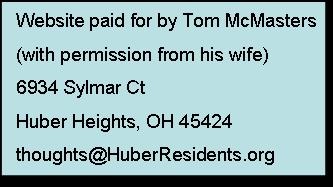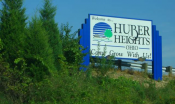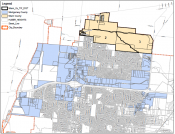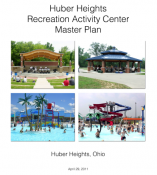Tuesday night the Administration Committee has three items concerning Carriage Trails on the agenda. The big one is the 11th Amendment to the DEC Development Agreement because this is the one that authorizes the city to pay about
Let me start with a couple quick background items.
1. Carriage Trails is in the Miami County TIF district. TIF's are complicated and if you are familiar with my discussion about Alcore you will be surprised to discover that the Carriage Trails Miami County TIF doesn't take any money from the Bethel Schools. Instead all the property tax diverted to TIF in this district would normally go to Miami County or Bethel Township projects such as supporting old cemeteries or to the City of Huber Heights General / Police / Fire Funds.
2. In a normal development such as "The Oaks" or "Callamere Farms" the developer pays for all roads and sewers during construction then at the end of the project the developer deeds the roads and sewers over to the city. From that point on the city pays for the upkeep.
Lets look at the DEC Development Agreement and the Special Assessment agenda items. From these we see that the city will be picking up about 38% of the cost of the roads and sewers. We also see that $6000 is about 10% of the total cost of roads and sewers. A quick calculation and we see that the city is paying about
Having the city pay for a good portion of the construction costs in Carriage Trails should make a house there much cheaper to purchase than the same house built in other developments. This helps explain why so many houses are sold in this development. Simplistically, someone might look at all these sales and think the city is better off. It's logical that turning fields and forest into blacktop and roofs is good because, "development always leads to more taxes collected". But it is important for the city to make sure that the amount of "more taxes" is enough to cover the higher costs associated with more blacktop and roofs.
Break Break ---- At this point the article is not finished. In order to get closer to finished I would need to consider:
1. The amount of property taxes the houses in Carriage Trails would normally pay toward the City's General Fund, Police Fund and Fire Fund
2. The demographics of the people that live in Carriage trails. Specifically, what is the break out of where they work. For instance if every person was active duty military then there would be zero dollars coming into the city to pay for police and fire services. However, if every working person was a Government Civilian that worked on base then the income tax revenues might be so large that it makes up for the loss of property tax.
3. If it turns out the income tax collections do not contribute enough to pay for city services is it smart for us to stop paying the developer's portion of future roads and sewers so we can use the diverted property tax for other infrastructure costs in or around this area?
4. If it turns out the income tax collections do contribute more than the rest of the city for police and fire services when are we going to show appreciation and start building the fire station that belongs up North?
I guess I should end with a pitch for you to come out to the Administration Committee meeting Tuesday at 6:00 pm 18 Mar 2014. Remember before that at 4:30 is the Public Works committee meeting. There should be a good discussion on Thomas Cloud Concession Stand and Restroom during this meeting.













 Edited
Edited
Comments
There have been no comments yet